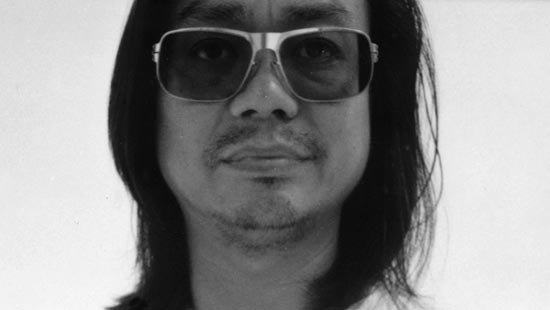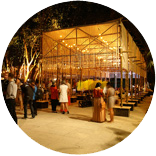Rirkrit Tiravanija

Born in Buenos Aires, the Thai artist Rirkrit Tiravanija is widely recognized as one of the most influential artists of his generation. His work defies media-based description, as his practice combines traditional object making, public and private performances, teaching, and other forms of public service and social action. Winner of the 2010 Absolut Art Award and the 2005 Hugo Boss Prize awarded by the Guggenheim Museum, Tiravanija has also been awarded the Benesse Prize by the Naoshima Contemporary Art Museum in Japan and the Smithsonian American Art Museum’s Lucelia Artist Award.
Tiravanija recently had a retrospective exhibition at the Kunsthalle Bielefeld. A previous retrospective exhibition was presented by the Museum Boijmans Van Beuningen in Rotterdam and then traveled to Paris and London. Tiravanija is on the faculty of the School of the Arts at Columbia University, and is a founding member and curator of Utopia Station, a collective project involving artists, art historians, and curators. He is also president of an educational-ecological project known as the Land Foundation in Chiang Mai, Thailand, and is part of a collective alternative space called VER, in Bangkok, where he maintains his primary residence and studio.
Vision Statement on Confronting Comfort
The city supplants traditional modes with a way of life that at once offers the individual a greater sense of freedom and a heightened awareness of isolation. —Louis Wirth
Architecture should have little to do with problem solving—rather it should create desirable conditions and opportunities hitherto thought impossible. —Cedric Price
But if Gerald ran the zoo, the New Zoo, McGrew Zoo, he’d see to making a change or two: “So I’d open each cage. I’d unlock every pen, let the animals go, and start over again.” —Dr. Seuss
I am interested in time
I am interested in time between spaces
I am interested in time and spaces between things
I am interested in time between spaces and things and people
I am interested in time between people
I am interested in spaces between people
I am interested in contingencies between people and place
I am interested in places where people can relate to each other despite their differences
I am interested in differences between people and how they relate
I am interested in sidewalks, which are full of people walking in different directions
I am interested in stalls, which appear and disappear on the sidewalks, which are full of people walking
I am interested in people gathering on street corners buying and eating Nathan’s hot dogs and pretzels
I am interested in the disruption of routines
I am interested in the appearance of variables that disrupt routines
I am interested in the suspension of time by the disruption of routines
I am interested in the idea of a flash mob
I am interested in detours
I am interested in detours that lead to new routes
I am interested in no destination
I am interested in constructing new destinations
I am interested in “a moment of life concretely and deliberately constructed by the collective organization of a unitary ambience and a game of events” (Internationale Situationniste, no. 1)
I am interested in the construction of a situation that does not necessarily amount to very much
I am interested in the critique of capitalist urbanism
I am interested in the idea that “urbanism is the most fully developed form of the concrete realization of a nightmare” (Raoul Vaneigem)
I am interested in constructing a condition in which people find themselves implicated
I am interested in constructing situations where people come together
I am interested in food that makes people warm in their bellies
I am interested in slowness
I am interested in the idea of incorporating the passing of time into the work of art
I am interested in Cedric Price’s Fun Palace
I am interested in Claes Oldenburg’s proposed Colossal Monument of Concrete Inscribed with the Names of War Heroes, which was to be realized at 57th Street and Fifth Avenue in New York
I am interested in the Peace Tower erected by Mark di Suvero, Arnold Mesches, and Irving Petlin against the Vietnam War in 1966
I am interested in the potentiality of a terrain that is located in the exchanges between the urban fabric, its users, and the wider context, and in the constant reformulation of this relation of exchange
I am interested in pulling the rug out from under the situation
I am interested in the idea of the potentiality to not do
—Rirkrit Tiravanija
Photo: courtesy Rirkrit Tiravanija

